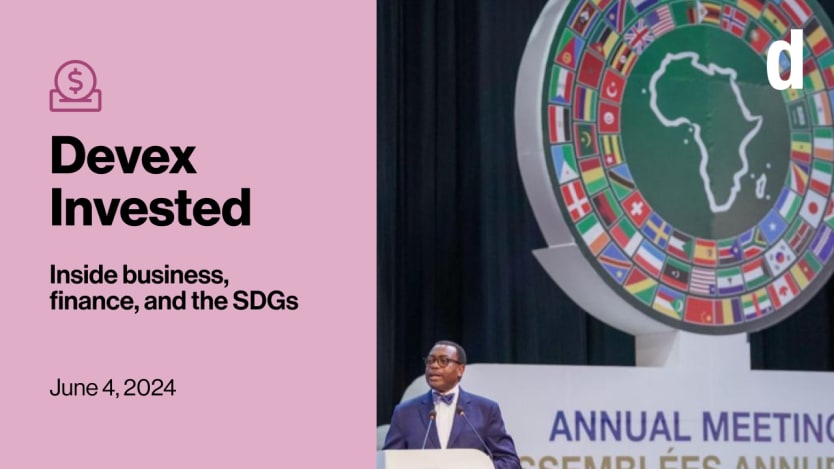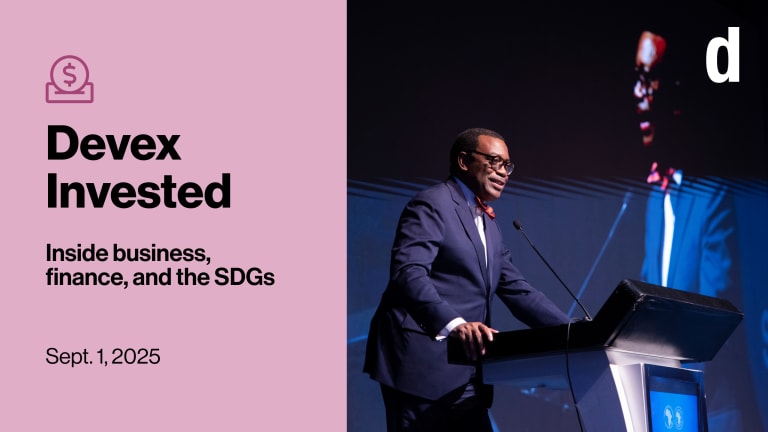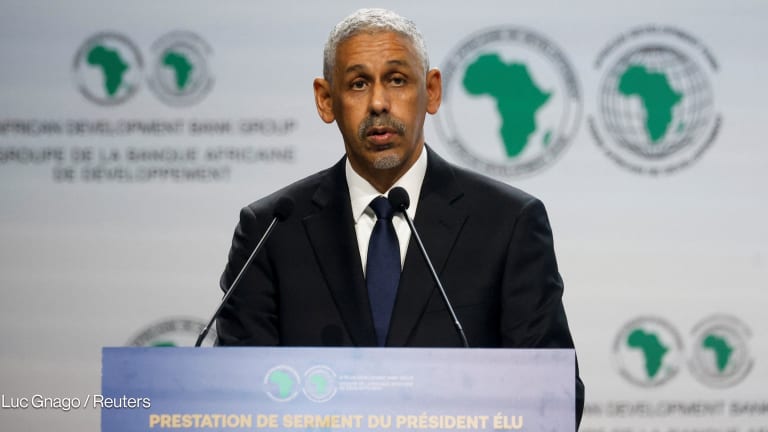
Thousands gathered last week in Nairobi, Kenya, for the African Development Bank’s annual meeting — an affair that comes at a time when all multilateral development banks are under scrutiny to reform and do more with their resources.
I was curious to see how the bank would respond to calls from shareholders to make changes. According to its new 10-year strategy released at the meeting, the bank “will pursue a range of options to boost its own financing capacity by USD73 billion over the life of the Strategy.”
This is a preview of Devex Invested
Sign up to this weekly newsletter to get the insider brief on business, finance, and the SDGs in your inbox every Tuesday.
The institution has been leading on creative financing mechanisms, including issuing $750 million in hybrid capital (part bond, part equity) to private investors in January and pushing for the International Monetary Fund to allow Special Drawing Rights to be used to fund MDBs, which was recently approved.
The new strategy contains some familiar pieces, but also some operational changes. It will guide AfDB’s work to achieve two strategic objectives: “accelerating inclusive green growth and driving prosperous and resilient economies in Africa.”
Also emerging from the annual meeting was approval from the bank’s board of governors of a $117 billion general callable capital increase for the bank. Callable capital is money that shareholders pledge but don’t give to the institution that acts as a backstop or guarantee of its investments in the case of catastrophe. The bank needed the additional resources to comply with a requirement from one of the big credit rating agencies that it have a certain level of AAA-rated callable capital to support increased lending.
“It is a major demonstration of the faith, of the confidence that our shareholders have in us, in our ability to use our resources well,” AfDB President Akinwumi Adesina said in a statement.
While AfDB was in the spotlight, the summit’s main themes were a bit broader, including global financial architecture reforms and debt in Africa. In this edition we’ll look at the annual meetings as well as the strategy itself, with reporting from Devex contributor Anthony Langat, who attended the summit last week.
So what’s in the new strategy?
Sticking around are the bank’s “High 5” operational priorities of universal electricity access, improving food security, industrialization, regional integration, and improving the quality of life of Africans — especially women and young people. Last year the bank financed more than $10 billion across those priorities, it says. Women, youth, climate change fragility, and governance are all cross-cutting priorities that it will look to address across its work, according to the strategy.
Expect the bank to focus more on the private sector, with a goal of tripling private-sector finance by 2033. “The Bank will provide support for private financing where appropriate and public finance only where necessary to preserve fiscal capacity within the region,” the strategy says.
It will also work to scale up finance from all sources — that means helping countries mobilize more domestic resources, grow financial sectors, and attract private finance.
Other changes you can expect: A shift in AfDB’s operational model to focus on large sustainable infrastructure projects through a platform-based approach that funds programs rather than projects. It will also focus more on capacity building, technical assistance, and policy issues — or what it calls “knowledge solutions.” The bank intends to partner more and improve the quality and efficiency of its operations, including simplifying processes and investing more in staff.
The bank says it’s “well on its way” to its goal of mobilizing $25 billion in climate finance, and that 45% of its total lending went to climate finance last year. Last week, its climate and energy investments were the subject of a protest outside the conference center where demonstrators criticized the bank for funding “dirty energy” — particularly natural gas.
When Adesina got a question about the bank’s funding of gas at a press conference, his response was categorical: The institution would not stop funding gas because the priority is getting energy to billions of Africans that don’t have access, Anthony tells me.
More money
Efforts to leverage its balance sheet can only go so far. AfDB’s concessional arm that focuses on vulnerable countries, the African Development Fund, will ask donors for more funding next year. Organizations at last week’s meetings were making the case for an ambitious replenishment of $25 billion — which may be made more challenging by the many other replenishments happening in the coming year, Anthony tells me.
The previous replenishment in 2023 raised $8.9 billion in core funding and an additional $429 million for the Climate Action Window.
Kenyan President William Ruto announced that his country would contribute $20 million to the African Development Fund to demonstrate Kenya’s “confidence” in the fund, and also spend more money to increase its shareholding in other African financial institutions including Afreximbank in coming years.
Read more: African Development Fund seeks $25B replenishment. Is it too ambitious?
Debt at home
While the global financial system needs to change, African nations also have a responsibility to make changes at home to improve their debt management, Anthony reports.
Three African countries have defaulted on their debt payments, and close to half of the countries on the continent are at risk of falling into debt distress. Countries need to improve their debt management to avoid a crisis. They also need to borrow smarter, experts say.
“It is a big issue because mobilizing capital is on one side but managing that capital effectively is another side,” says Kevin Urama, chief economist and vice president at the African Development Bank Group.
Part of the debt burden is due to the high borrowing costs for African countries, most of which have poor credit ratings. Kenya’s Ruto and others at the summit criticized the current credit rating system as biased against Africans and called for a new institution. The African Union is establishing an African Credit Rating Agency, though not everyone thinks it's a good idea.
But Urama tells Anthony that the bias isn’t entirely the fault of the credit rating agencies. Their methodologies focus on specific metrics to measure risks, and some African countries are missing the relevant data, Urama says, adding that the agencies also don’t have representation in every country. “How best will you understand the risks in a country if you are not there?” Urama asks.
Countries also need better access to concessional financing (i.e. grants and low-cost loans) to reduce their reliance on commercial borrowing, Yemi Kale, the group chief economist and managing director of research and international cooperation at Afreximbank, writes in an opinion piece for Devex.
Kale calls on African nations to lobby for MDB reform and to push international institutions to restructure debt so that African nations can finance basic health and education needs while also addressing climate.
Read: African countries urged to look internally to manage debt
Opinion: Debt is crippling Africa’s net zero transition potential
+ Devex Pro members can read about a fix proposed by a group of IMF economists to address Africa nations’ high borrowing cost.
Not yet a Pro member? Access all our exclusive reporting and analyses, members-only events, the world’s largest global development job board, and more by starting a 15-day free trial today.
An African agenda
Your next job?
Senior Financial Engineering Specialist
Islamic Development Bank
Saudi Arabia
The much-needed MDB reform agenda is undoubtedly being driven by Western governments. But what do borrower countries think — particularly those in Africa?
Kenya’s Ruto emphasized the need for change, saying at the summit, “Today, we assert that transforming the international financial architecture is imperative to give Africa a fair chance to turn its immense potential into opportunities to overcome multiple challenges and develop inclusively and sustainably.”
African nations need access to concessional finance, which means that the World Bank — which has focused its reforms on its lending arm for middle-income countries — needs to get creative in boosting funding for the International Development Association, the bank’s fund for the lowest-income countries, said Mavis Owusu-Gyamfi, executive vice president, African Center for Economic Transformation, at a Center for Global Development side event in Nairobi last week.
More of that concessional cash should be spent on infrastructure, which “delivers endogenous growth. It’s a productive asset and effectively a public good,” said Hannah Ryder, CEO of Development Reimagined, adding that IDA currently spends less than 50% of its budget on physical infrastructure.
African governments need “more voice” in how MDBs are run, several African development leaders said at the CGD event last week. This means difficult conversations about quotes and voting shares for Africa. “We are told that ‘the geopolitics is tough.’ But that’s just not good enough,” Owusu-Gyamfi said.
Related reading: World Bank's Banga wants 'largest of all time' IDA replenishment (Pro)
What we’re reading
The World Health Organization launches its first investment round, asking for $11 billion. [Devex]
Why is so little climate finance going to local organizations? [Devex]
Inside Melinda French Gates’ $1 billion “incredible experiment.” [Devex Pro]
The global financial system is in danger of fragmenting. [The Economist]
Anthony Langat and Sophie Edwards contributed to this edition of Devex Invested.








